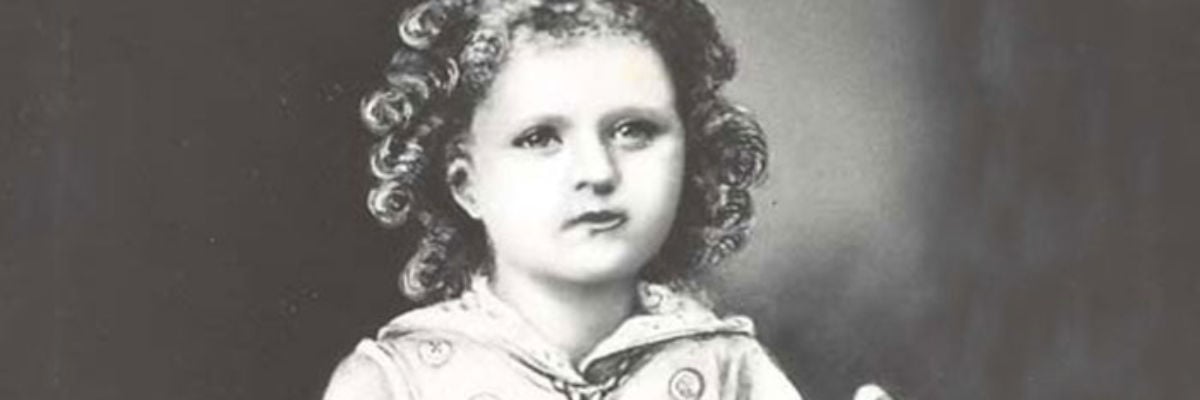
There is a wonderful story told by St. Thérèse of Lisieux in her autobiography, Story of a Soul, of an incident that happened to her as a child. Her older sister, Léonie, having outgrown playing with dolls, brought a basket of stuff for making dolls’ dresses to her younger sisters, Céline and Thérèse, with her own doll resting on top of it. She offered the basket to them, saying: “Here, dears, choose whatever you like.” Céline, the elder of the two, took a ball of wool that caught her eye, but the two-year-old Thérèse simply stated, “I choose all!” and, without ceremony, took basket, doll, and all!
This event reflects the attitude that Thérèse had about all life, as she relates in Story of a Soul:
This little incident of my childhood is a summary of my whole life; later on when perfection was set before me, I understood that to become a saint one had to suffer much… Then, as in the days of my childhood, I cried out: “My God ‘I choose all!’ I don’t want to be a saint by halves, I’m not afraid to suffer for you, I fear only one thing: to keep my own will; so take it, for ‘I choose all!’ that you will!”
While the child Thérèse illustrates, in her precocious, bold audacity, the depth of human desire—a desire that is finally fulfilled only in God—I think that there is another reflection that might be gleaned from this account.
God speaks to each of us with the same enthusiastic desire that Thérèse exhibits, as we come before him with the basket of our life, often in fear and trembling, and offer it to him—inviting him to take something from it. Of course, what we most readily offer are the choice parts: those parts that we think might please him best, or the parts we feel are safe to offer him, or those parts that we think won’t cost us too much to give away.
However, there are other aspects of life that we are less than willing to offer God: the areas of our weakness, sinfulness, and hurt; the grudges and grievances we harbor; the parts of our broken humanness that plague and embarrass us; all those many parts of the self that are so fraught with imperfection.
And we can get angry about it too. The command of Jesus to “be perfect as your heavenly Father is perfect” seems impossible, a downright outrageous thing to ask of any human being! Aware of the weakness and darkness that lies lurking in our hearts, we, like Martha before the tomb, cry, “Don’t open it, Lord! There’ll be a stench!” and we so often turn away from him and hide in our hurt.
But Love is not easily satisfied. God is like little Thérèse. Looking at the basket-case that we are, he says matter-of-factly, “I choose all!” In our hearts in those moments rise the words he spoke to Martha: “Did I not tell you that if you believe, you will see the glory of God?”
And what is the glory of God? St. Ireneaus tells us: “The glory of God is man fully alive!” That is perfection in the eyes of God—to be perfect as a human being is to be authentically and fully human, just as God is perfect in being fully divine.
St. John Paul II said the same thing in other words, exhorting families to “become what you are.” But we need the grace of Jesus Christ, he who is “the resurrection and the life,” to renew, restore, heal, perfect and elevate every aspect of our humanity—the good, the bad, and the ugly—into the fullness of the image and likeness of God. This is to become fully human, surrendering to God all we are and have so that we might in return accept all from God, as Thérèse did.
It’s the remarkable exchange: our everything (which is, in fact, nothing) for God’s everything (which is, in fact, everything). In this exchange of all for all, we get the sweet end of the deal.
This is the heart of the genius of St. Thérèse and her Little Way. In our willing acceptance of our imperfection and weakness, our poverty and our need, God meets us. Thérèse encourages us in childlike confidence to be assured that even the slightest and smallest step toward God is enough to bring down his love and mercy upon us. We can be sure that if we are willing to move towards God as far as we can—be it only a little way—he, in his tender-kindness and goodness, will make up the difference.
This is also at the heart of the missionary spirit of St. Thérèse (a patroness of missions), for as another holy woman, Catherine Doherty, suggests, the first mission field is the human heart—where every decision for or against God and neighbor is made. We need but to humbly accept our weaknesses as opportunities to encounter God more and more deeply, and so open our hearts to God more totally—allowing him to choose all, and transform all in his love.
John Paul II describes authentic human formation as a movement from self-knowledge to self-acceptance to self-gift. It requires a total vision of the human person in all aspects of his being—physical, spiritual, emotional, social, and intellectual—and involves the redemption and perfection of all these aspects in Christ.
And Thérèse teaches us this. “Thérèse is a Teacher for our time,” John Paul wrote in Divini Amoris Scientia, in which he declared the Little Flower a Doctor of the Church, “a teacher of the evangelical life, particularly effective in illumining the paths of young people, who must become the leaders and witnesses of the Gospel to the new generations.”
Certainly, I have seen this witness in my years of work in the formation of young adults—a myriad of hopes, joys, desires, lives all restored through childlike surrender to God’s love. Perhaps in these days as never before, amid pandemic fears, increasing isolation and division, social unrest, and growing animosities, even within the Church, we stand in need of a teacher like Thérèse, who can help us to surrender all and so to choose all.



